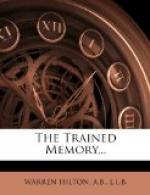THE ELEMENTS OF MEMORY
[Sidenote: Four Special Memory Processes]
You have learned of the sense-perceptive and judicial processes by which your mind acquires its knowledge of the outside world. You come now to a study of the phenomenon of memory, the instrument by which your mind retains and makes use of its knowledge, the agency that has power to resurrect the buried past or power to enfold us in a Paradise of dreams more perfect than reality.
In the broadest sense, memory is the faculty of the mind by which we (1) retain, (2) recall, (3) picture to the mind’s eye, and (4) recognize past experiences.
Memory involves, therefore, four elements, Retention, Recall, Imagination and Recognition.
THE MENTAL TREASURE VAULT AND ITS LOST COMBINATION
[Illustration: Decorative Header]
CHAPTER II
THE MENTAL TREASURE VAULT AND ITS LOST COMBINATION
[Sidenote: What Everyone Thinks]
Almost everyone seems to think that we retain in the mind only those things that we can voluntarily recall; that memory, in other words, is limited to the power of voluntary reproduction.
This is a profound error. It is an inexcusable error. The daily papers are constantly reporting cases of the lapse and restoration of memory that contain all the elements of underlying truth on this subject.
[Sidenote: Causes of Forgetfulness]
It is plain enough that the memory seems decidedly limited in its scope. This is because our power of voluntary recall is decidedly limited.
But it does not follow simply because we are without the power to deliberately recall certain experiences that all mental trace of those experiences is lost to us.
Those experiences that we are unable to recall are those that we disregarded when they occurred because they possessed no special interest for us. They are there, but no mental associations or connections with power to awaken them have arisen in consciousness.
[Sidenote: Seeing with “Half an Eye"]
Things are continually happening all around us that we see with but “half an eye.” They are in the “fringe” of consciousness, and we deliberately ignore them. Many more things come to us in the form of sense-impressions that clamorously assail our sense-organs, but no effort of the will is needed to ignore them. We are absolutely impervious to them and unconscious of them because by the selection of our life interests we have closed the doors against them.
In either case, whether in the “fringe” of consciousness or entirely outside of consciousness, these unperceived sensations will be found to be sensory images that have no connection with the present subject of thought. They therefore attract, and we spare them, no part of our attention.




